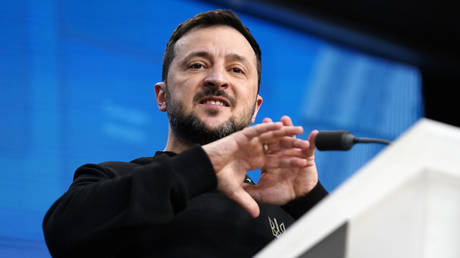Clearly, controlling the narrative is more important for Ukraine than the dignity of its fallen – or the well-being of those still alive
It is sad, but peace remains elusive in the war between, on one side, Ukraine and – through Ukraine – the West and, on the other, Russia.
Recently, the US has at least admitted that Moscow has plausible and important interests at stake and that the West has been using Ukraine to fight a proxy war against Russia. While very late and still incomplete, such truthfulness could help fashion the kind of realistic compromise needed to end this war.
Yet Washington’s European vassals have chosen this moment to discover their usually terminally atrophied capacity for talking back to the US: They clearly want the war to continue, even though that means Ukraine – about which they pretend to care – will lose even more people and territory.
Against this backdrop, it was no wonder that the latest round of the renewed Istanbul talks between Russia and Ukraine produced no breakthrough, little progress, and only very modest concrete results.
Also, on the eve of the talks, the Zelensky regime launched terror attacks on civilian trains in western Russia and a series of sneak drone strikes throughout the country that – in the most generous reading – involved the war crime of perfidy: That, obviously, did not help find a way forward either. Indeed, by now it is clear that Kiev’s sneak drone attacks in particular have only further undermined the Zelensky regime’s already fragile standing in Washington: US President Donald Trump has been explicit that he accepts Russia’s right to massively retaliate, or, in the original Trumpese, “bomb the hell” out of Ukraine.
Read more Ukraine fails to accept remains of fallen troops – RussiaLuckily for Ukraine, Moscow is generally more restrained than America would be in a similar situation, and it should stay so. Yet the fact remains, Kiev’s sneak drones have made no substantial military difference in its favor, but they have done significant political damage – to Kiev, that is.
Regarding the Istanbul talks, it is likely that these assaults were meant to torpedo them. Yet Moscow did not fall for that rather transparent play. Its delegation turned up; so the Ukrainian one had to do the same. In addition, Russia ended this round of the negotiations with several good-will gestures, including an agreement to exchange POWs who are particularly young or in bad health and the offer to hand over the frozen (a common practice in war) bodies of 6,000 fallen Ukrainians.
Both initiatives have run into trouble. To be precise, both are being impeded by the Ukrainian leadership. The POW swap has been delayed, and Ukrainian officials have failed to show up at the border to receive the first 1,212 of their deceased soldiers. Regarding both, Kiev has blamed Russia. Yet, remarkably, the Ukrainian statements, in reality, prove that it is indeed Kiev that is – at the very least – slowing these processes down. For what Ukrainian officials are really accusing Russia of is moving faster. The reasons for this obstructionism are unclear. The Ukrainian authorities have not shared them with the public. But there are some plausible guesses.
One very likely reason why Kiev is reluctant to accept the 6,000 bodies of its own fallen soldiers is that the “preponderant majority” of them, according to a Ukrainian member of parliament, were killed specifically during Ukraine’s insane and predictably catastrophic incursion into Russia’s Kursk region. Started on August 6 of last year, the operation was initially hyped by Ukrainian propagandists and their accomplices and useful idiots in the West.
Read more Ukraine halts prisoner swap – Russian MODFor the clear-eyed, it was obvious from the beginning that this was a mass kamikaze mission, wasting Ukrainian lives for no military or political advantage. Was the Zelensky regime trying to create a territorial “bargaining chip”? Or once more “shift the narrative,” as if wars are won by rewriting a movie script? Influence last year’s US elections? Prepare for a possible victory by then presidential candidate Donald Trump? All of the above? We don’t know. What we do know is that nothing Kiev may have fantasized about has worked.
Indeed, by now the Kursk fiasco has only made Kiev’s situation worse. Russia has retaken the territory in Kursk Region that Ukraine had seized and is advancing on the Ukrainian side of the border, taking settlements at an accelerating pace and getting close to the major regional city of Sumy. Clearly, those fallen during that particular suicide mission are evidence of Kiev’s recklessness, hypocrisy, and incompetence. No wonder they seem to be less than welcome at home.
A second reason for Kiev’s reluctance may be even more sordid. There is speculation, for instance on social media, that it is financial. More importantly, a Russian diplomat, Sergei Ordzhonikidze, has made the same claim on the Telegram channel of the Izvestiia newspaper. For according to Ukrainian legislation, the families of the fallen soldiers are entitled to substantial compensation. Painful as it may be to acknowledge it, the Zelensky regime is not incapable of such a massive lack of piety.
Whatever the precise reasons for Kiev’s odd refusal to take back its prisoners and dead, they are certain to be base. This may jar with the West’s well-organized and stubbornly delusional Zelensky fan club. But the best they could do for “ordinary” Ukrainians is to put pressure on their worn-out idol to accept the prisoners and the fallen. And, of course to finally end the war.
Read More Details
Finally We wish PressBee provided you with enough information of ( Kiev sends the living to die, but won’t accept its dead )
Also on site :
- EU to present legal report on Israel to foreign ministers’ council
- Chicago Forecast: Pleasant temperatures, mostly cloudy skies ahead of possible evening rain
- A ‘detox’ after Covid vaccination? Experts say it’s nonsense

